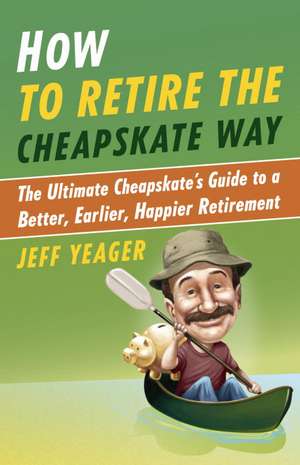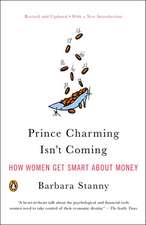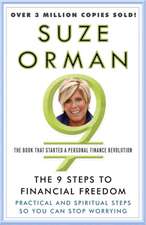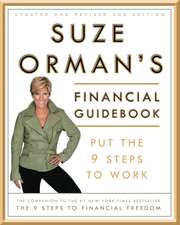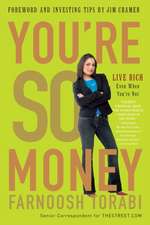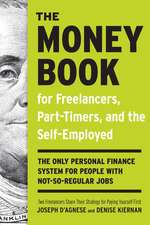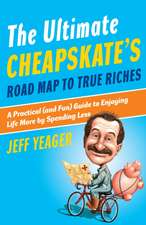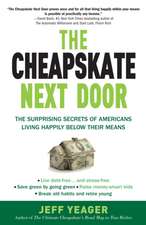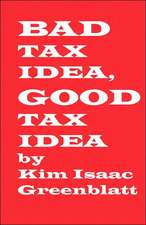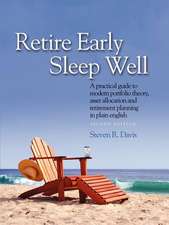How to Retire the Cheapskate Way: The Ultimate Cheapskate's Guide to a Better, Earlier, Happier Retirement
Autor Jeffrey Yeager, Jeff Yeageren Limba Engleză Paperback – 31 dec 2012
Combining Yeager’s loveable humor and offbeat anecdotes that have garnered him an ever-growing fan base, How to Retire the Cheapskate Way shares with readers hundreds of retirement secrets and tips, including:
·How to Simple-size Your Way to a Better Retirement
·The 20 Secret Cheapskate Principles for Retiring Comfortably on Less...Maybe Even on Social Security Alone
·How to Survive the Medical Maelstrom (without resorting to DIY surgery at home)
·Plus Dozens of Fun Ways to Both Earn a Little Extra Income During Retirement and Painlessly Cut Your Expenses
Yeager, who serves as the official “Savings Expert” for AARP and its 40+ million members, weaves together both everyday practical tips and life-changing financial strategies with the real life stories of frugal retirees as well as people of all ages who are working toward a better, earlier, happier retirement The Cheapskate Way.
Preț: 112.97 lei
Nou
Puncte Express: 169
Preț estimativ în valută:
21.62€ • 22.49$ • 17.85£
21.62€ • 22.49$ • 17.85£
Carte disponibilă
Livrare economică 22 martie-05 aprilie
Preluare comenzi: 021 569.72.76
Specificații
ISBN-13: 9780307956422
ISBN-10: 0307956423
Pagini: 320
Dimensiuni: 132 x 204 x 22 mm
Greutate: 0.26 kg
Editura: Three Rivers Press (CA)
ISBN-10: 0307956423
Pagini: 320
Dimensiuni: 132 x 204 x 22 mm
Greutate: 0.26 kg
Editura: Three Rivers Press (CA)
Recenzii
Praise for How To Retire the Cheapskate Way
“On paper, it might seem a difficult task: Retire on the cheap while enjoying the standard of living to which you are accustomed or you desire. But Jeff Yeager reports that it’s really possible.” —The Wall Street Journal's Marketwatch
“If you think you can’t possibly pare even a penny from your budget, you’re not thinking like Jeff Yeager. [The] ‘Ultimate Cheapskate’ reveals his tips for finding big savings… Behold the World Easiest Retirement-Savings Plan.”—AARP The Magazine
"Jeff Yeager knows the secrets to a worry-free retirement, laying out hundreds of surprising ways to get there and unleashing the inner cheapskate in us all!"—Jean Chatzky, bestselling author and financial expert
"Jeff is the consummate troubador for our clan, offering high-joy, low-cost solutions to life's challenges."—Vicki Robin, co-author of Your Money, Your Life
"Full of practical advice and numerous stories of "cheapskates" who have retired early, this book prompts readers to reexamine how to spend their money. Believing that it's not how much money you make, but how you spend what you do have that makes the difference between an early retirement, fee of debt, or a later one, full of money woes, the author gives simple and sound advice on how to live frugally."—Kirkus
Praise for Jeff Yeager
“Whether you are a born penny pincher or merely cheapskate-curious, you're bound to learn something from the Cheapskate Next Door.”
—USA Today
“Jeff Yeager has been one of our favorite guests over the years, and has turned pinching pennies into an art form.”
—Matt Lauer
“Yeager is back with another energetic, likeably eccentric lesson on living happily well below your means. Yeager and his ‘Miser Advisers’ are proof that living more frugally isn’t about sacrifice—it’s about making choices every day to live a better, happier, more thoughtful life with less.”
—Publishers Weekly
"What do we all want out of life? To enjoy it to the fullest! Jeff Yeager does a great job showing the way to enjoyment is to be free from debt and clutter, and to have a great time while getting there!"
—Janet Luhrs, author of The Simple Living Guide and the Simple Living newsletter, www.simpleliving.com
“Slay your Enoughasaurus and learn to skip the Money Step with help from The Ultimate Cheapskate. Jeff Yeager's edgy humor and surprising insights make this book a very different read than the usual financial tomes. This guy takes thinking outside the box to a new level.”
—Gregory Karp, “Spending Smart” newspaper columnist and author of Living Rich by Spending Smart
“Yeager is back with another energetic, likeably eccentric lesson on living happily well below your means. Yeager and his ‘Miser Advisers’ are proof that living more frugally isn’t about sacrifice—it’s about making choices every day to live a better, happier, more thoughtful life with less.”
—Publishers Weekly
“On paper, it might seem a difficult task: Retire on the cheap while enjoying the standard of living to which you are accustomed or you desire. But Jeff Yeager reports that it’s really possible.” —The Wall Street Journal's Marketwatch
“If you think you can’t possibly pare even a penny from your budget, you’re not thinking like Jeff Yeager. [The] ‘Ultimate Cheapskate’ reveals his tips for finding big savings… Behold the World Easiest Retirement-Savings Plan.”—AARP The Magazine
"Jeff Yeager knows the secrets to a worry-free retirement, laying out hundreds of surprising ways to get there and unleashing the inner cheapskate in us all!"—Jean Chatzky, bestselling author and financial expert
"Jeff is the consummate troubador for our clan, offering high-joy, low-cost solutions to life's challenges."—Vicki Robin, co-author of Your Money, Your Life
"Full of practical advice and numerous stories of "cheapskates" who have retired early, this book prompts readers to reexamine how to spend their money. Believing that it's not how much money you make, but how you spend what you do have that makes the difference between an early retirement, fee of debt, or a later one, full of money woes, the author gives simple and sound advice on how to live frugally."—Kirkus
Praise for Jeff Yeager
“Whether you are a born penny pincher or merely cheapskate-curious, you're bound to learn something from the Cheapskate Next Door.”
—USA Today
“Jeff Yeager has been one of our favorite guests over the years, and has turned pinching pennies into an art form.”
—Matt Lauer
“Yeager is back with another energetic, likeably eccentric lesson on living happily well below your means. Yeager and his ‘Miser Advisers’ are proof that living more frugally isn’t about sacrifice—it’s about making choices every day to live a better, happier, more thoughtful life with less.”
—Publishers Weekly
"What do we all want out of life? To enjoy it to the fullest! Jeff Yeager does a great job showing the way to enjoyment is to be free from debt and clutter, and to have a great time while getting there!"
—Janet Luhrs, author of The Simple Living Guide and the Simple Living newsletter, www.simpleliving.com
“Slay your Enoughasaurus and learn to skip the Money Step with help from The Ultimate Cheapskate. Jeff Yeager's edgy humor and surprising insights make this book a very different read than the usual financial tomes. This guy takes thinking outside the box to a new level.”
—Gregory Karp, “Spending Smart” newspaper columnist and author of Living Rich by Spending Smart
“Yeager is back with another energetic, likeably eccentric lesson on living happily well below your means. Yeager and his ‘Miser Advisers’ are proof that living more frugally isn’t about sacrifice—it’s about making choices every day to live a better, happier, more thoughtful life with less.”
—Publishers Weekly
Cuprins
Chapter 1 Introduction: Who Says You Can’t Afford to Retire? Just Go Ask a Cheapskate
Kelly and Jon Nowak: Newlyweds, But Not Newly Frugal
Chapter 2 Getting Your Money Priorities Straight, Cheapskate Style
The Cedotal Family: The Whole Wide World in Their Hands
Chapter 3 How Much Money Do You Really Need to Retire?
Lys and Dan Burden: Lifting Off to Retirement
Chapter 4 50 Painless Ways to Feather Your Retirement Nest Egg
Stacie Barnett: A Born Again Cheapskate
Chapter 5 Can You Live Comfortably Retire on Social Security Alone?
Jerry Dyson: Happiness Is Wanting What Have
Chapter 6 Simple size Your Way to the Right Size
Bruce Jackson: Live Simply So Others May Simply Live
Chapter 7 Surviving the Medical Maelstrom
Wanda Adams: Laughter Is the Best Medicine (but long term care insurance might be a good idea, too)
Chapter 8 I’m Not Retired I’m Selfishly Employed
Linda and David Allen: Cruising Through a Cheapskate Retirement
Chapter 9 Time to Save $10,000 a Year (or MUCH more!) Now That You’re Retired
Verna Oller: A Heart of Gold, and Old Zippers for Shoelaces
Chapter 10 How to Take It with You
Acknowledgments
Kelly and Jon Nowak: Newlyweds, But Not Newly Frugal
Chapter 2 Getting Your Money Priorities Straight, Cheapskate Style
The Cedotal Family: The Whole Wide World in Their Hands
Chapter 3 How Much Money Do You Really Need to Retire?
Lys and Dan Burden: Lifting Off to Retirement
Chapter 4 50 Painless Ways to Feather Your Retirement Nest Egg
Stacie Barnett: A Born Again Cheapskate
Chapter 5 Can You Live Comfortably Retire on Social Security Alone?
Jerry Dyson: Happiness Is Wanting What Have
Chapter 6 Simple size Your Way to the Right Size
Bruce Jackson: Live Simply So Others May Simply Live
Chapter 7 Surviving the Medical Maelstrom
Wanda Adams: Laughter Is the Best Medicine (but long term care insurance might be a good idea, too)
Chapter 8 I’m Not Retired I’m Selfishly Employed
Linda and David Allen: Cruising Through a Cheapskate Retirement
Chapter 9 Time to Save $10,000 a Year (or MUCH more!) Now That You’re Retired
Verna Oller: A Heart of Gold, and Old Zippers for Shoelaces
Chapter 10 How to Take It with You
Acknowledgments
Notă biografică
JEFF YEAGER is the author of The Ultimate Cheapskate's Road Map to True Riches, The Cheapskate Next Door, and Don't Throw That Away!. He has appeared as a guest correspondent on NBC’s Today Show and Discovery’s Planet Green network. He is also the author of the popular blog The Green Cheapskate, www.TheDailyGreen.com. Visit him at www.UltimateCheapskate.com.
Extras
Chapter 1
Introduction: Who Says You Can’t Afford to Retire? Just Go Ask a Cheapskate
Everything we’d ever read or been told about retirement planning and investing seemed to be a lie, or at least wasn’t working out for us. It wasn’t until we really started looking at the spending side of our finances that we began to feel like retirement was once again something within our reach . . . something we could actually control. We realized that we could simplify our lives and retire very happily on less money than we ever thought possible.
--Frugal retirees Doris and Chuck Wye
Whether your goal is to retire early or simply enjoy retirement more, this book will show you how the key to realizing your retirement dreams is more about how--and how much--you spend than it is about complicated investment schemes or even the size of your retirement nest egg.
That should be a refreshing message to many Americans today: Since the start of the Great Recession in 2008, Americans have lost more than $2 trillion in retirement savings--that’s more than a third of their prerecession savings--not including the drop in the value of their homes. According to a 2011 Gallup poll, nearly 60 percent of those surveyed had changed their retirement plans because of the economic downturn. Record numbers of Americans now say they’ll need to work longer than planned or believe that they may never be able to afford retirement.
Not so fast, say my happily retired cheapskate friends, as well as other masters of smart spending who are still working toward their dream retirements, with their retirement plans unaltered by the economic meltdown going on around them. This book contains their retirement blueprints, their tried-and-true plans for retiring the cheapskate way.
In the pages ahead, you’ll meet some of my fellow “cheapskates,” and I don’t use that term in a pejorative sense. If you prefer, call us “frugal,” “thrifty,” or even just “smart consumers.” In my own lexicon, being a “cheapskate” is a virtue, not a vice. It’s not about being greedy or dishonest, and it’s not about sacrifice or deprivation. It’s all about choices--deciding what’s really important in your life (particularly those things that come without a price tag) and skipping the rest. I honestly believe that most Americans--not all, but most--would be happier, and the quality of their lives would actually increase, if only they would spend and consume less.
So, to me, a “cheapskate” is the polar opposite of a “conspicuous consumer.” Cheapskates are too self-confident--and frankly too smart--to spend money on things they don’t need, and probably don’t even want, just to impress others. Cheapskates believe that their time here on earth is too precious to waste it chasing after more money and more stuff than what they really need. And, as you’ll see, many of them have decided they really don’t “need” that much to be happy.
At age fifty-four, I’ve been a practicing cheapskate most of my adult life, although I’ve fallen off the wagon a few times along the way. Having grown up in the rural Midwest, in a family that viewed spending money as an option of last resort, I was raised in a culture that knew the value of a dollar and placed a premium on thrift and frugality. Heck, we were proud of our ability to pinch a penny until Lincoln cried. In fact, rumor has it that the Yeager family crest bears the inscription “Spartium Homo Erectus,” which, of course, is Latin for “Cheapskate Who Stands on Two Feet.”
We were by no means poor. But with two sets of grandparents hardened by living through the Great Depression and loving parents who taught us that many of the best things in life truly are free, I learned the value of “thriftcraft” at a young age. It’s little wonder that, with my upbringing, for a career I settled in the nonprofit sector--where stretching a buck is a job requirement--and spent twenty-five years as a CEO and fund-raiser for a number of national nonprofit organizations in Washington, DC.
Because I practice what I preach when it comes to frugal living and smart money management, at the age of forty seven I was able to “functionally retire,” or--as I’ll talk more about later--become “selfishly employed.” Selfish employment is when you have at least enough financial security and independence to be able to do whatever the heck you want to do for a living, regardless of how much you might, or might not, earn from doing it. So that’s when I became the Ultimate Cheapskate and started writing about money (and, specifically, spending less of it!), based on my own life experiences and the financial lessons I’d learned as a nonprofit manager.
That was seven years and three books ago, and during that time I’ve been thinking a lot about the topic of retirement and talking with a great many of my Miser Advisers about it as well. Miser Advisers? Oh, those are fellow frugal folks living all around the world who keep me supplied with tips, stories, and ideas about enjoying life more by spending less--my sort of “bargain-basement brain trust.” You’ll meet some of them shortly.
What occurred to me was that we cheapskates have some rather different views and approaches to retirement from those of most people, just as we do on lots of things in life . . . well, at least those things involving money. While no two cheapskates are alike--nor are their visions or plans for retirement--I found in my conversations and research that many of us share certain common strategies when it comes to achieving our retirement dreams, whatever they may be. I found that there really is a “cheapskate way to retire better, earlier, and happier.” Particularly in light of the impact the current economy is having on most people’s retirement plans, I thought that sharing what I’ve learned on the topic in this book might help people gain a new, more positive perspective on their own retirements.
Because I don’t write traditional personal finance books, I always feel compelled to give readers a few words of advance warning about what to expect. As I often say: I don’t write books about how to get rich; I write books about how to get happy, perhaps with what you already have. That seems to me to be the real key to enjoying life, particularly when it comes to enjoying retirement, when many will be living on a fixed income.
So by way of warning, if you’re looking for a book about retirement investing--particularly magical ways to hatch an ostrich-size retirement nest egg overnight without working or planning for it--this isn’t that book. The good news is, most books written about retirement focus almost exclusively on investing, so go pick up one of those books instead. Of course, these days, a lot of those tomes should be reclassified from nonfiction to fiction, given the experience of countless folks like Doris and Chuck Wye, who followed their advice like a rooster chasing a hen around the barnyard, and with a similar outcome. That’s right, they got screwed.
No, while this book offers lots of practical advice on how it’s possible to free up money you didn’t think you could and thereby have more to set aside for retirement, other than a few anecdotal stories about how different cheapskates have in their own lives invested their retirement nest eggs, this is not a book about investing. This is a book about what I believe is the more important side of personal finance and retirement planning: the spending side.
Few people have the luxury of setting their own salaries, or dictating the rate of return on their investments, or knowing with any certainty that the lottery ticket they buy today is going to be the mega-million-dollar winner tomorrow. But every day, whenever we get out our wallets or open up our purses, we’re controlling--or, in many instances, choosing not to control--the spending side of our finances. That’s why “return on noninvestment” (as in “NOT SPENDING!”) is ultimately a far more important and powerful concept than the incessantly discussed, debated, and written-about concept of “return on investment.”
The other thing I’ll warn you about up front is that I know for a fact you won’t be able to relate to every cheapskate you’ll meet in the pages ahead. You may even find some of them and their lifestyles, well, a little weird or off-putting. In selecting people to include in this book, I tried to purposely recruit a diverse group, people leading a wide range of lifestyles, with different backgrounds, family situations, retirement plans, and expectations, and, yes, occasionally quirky behavior.
So, while you may not see yourself in each and every person or family I mention in the book--in fact you should have yourself tested for multiple personality disorder if you do--I trust that by the end you will have at least a small epiphany: Gee, there’s someone out there just like me who is planning for or already enjoying the retirement I want, and they’re doing it better than me and for much less. They’re retiring the cheapskate way, and I can too!
Tell Me What You Want, What You Really Really Want
I guess for a long time I was like a lot of young people. I was going along in life, working at a job that for the most part was enjoyable and rewarding enough. However, as the workweek wore on, like most people, I found myself humming the words to a familiar country-and-western song more and more often--you know, “Working for the Weekend.” That’s when I first started to think about retirement.
I was in my mid-twenties, married to Denise--the love of my life, whom I met my senior year in college--and working for a nonprofit organization in Washington, DC. I deeply supported (and still do) the mission of that organization, American Youth Hostels. It had helped shape my life since I was a teenager and taught me that travel is among the highest forms of education and one of the richest values in life.
I loved the people I worked with, and the work itself--planning bicycle and hiking trips all around the globe for groups of young people--was as fascinating as it was sometimes stressful.
There were midnight calls from frantic trip leaders to report lost group members, lost bicycles, lost passports, lost virginities, lost airline tickets, lost traveler’s checks, and--in more than one case--lost trip leaders. “You’re the leader. You can’t be lost,” I’d tell them. “Everyone else is lost. Now get on your bicycle and go find them!”
Then there were the ten angry calls from ten angry parents and their ten angry attorneys one sweaty Monday morning in July 1981. That was the day after their thirteen-and fourteen-year-old darlings had arrived home from one of our European bike tours, all sporting freshly minted tattoos and assorted body piercings, authorized by the trip leader as their temporary legal guardian. Apparently what happens in Amsterdam doesn’t stay in Amsterdam. Pass the Maalox, please.
After a few months in that job, my skin grew thicker as my stomach lining grew thinner. But the realization that I wasn’t getting any younger started to weigh more and more on my mind. I started paying much greater attention to my paycheck, what little was left of it after that FICA guy took his cut.
Working in the nonprofit sector had intangible rewards for sure. But when it came to more mundane affairs like salaries, benefits, and retirement plans, you had to swallow pretty hard every other Friday when Annette from the accounting department handed you your paycheck. As the sign I posted on the bulletin board in my office cubicle read, “Working here is like peeing your pants when you’re wearing a dark blue suit: You feel nice and warm all over, but nobody notices.”
That really wasn’t true though, and I knew it. I knew that the organization I was working for and the job I was doing were having a positive impact on the lives of thousands of young people, just as it had helped shape my own life. I knew that at least for some of them, it would truly be a life-changing experience, lasting far beyond the time it took for their tattoo removal scars to heal over.
But the thing I didn’t know was how I could continue to afford to do the type of low-paying work I was drawn to, while at the same time enjoying a comfortable-if-not-luxurious life and building enough financial security so that someday Denise and I could retire. At that point, I hadn’t even been able to free up enough extra funds to match my employer’s modest contribution to the organization’s 403(b) retirement plan, the nonprofit version of a 401(k).
One spring day I was sitting on a bench in Franklin Park across the street from the youth hostel where our offices were located. I had just chomped into the cold-cut sub I bought most every day for lunch at the New Yorkߝstyle deli across the street. A coworker, Bob Johnson, walked up and asked if he could join me.
I didn’t know Bob well, although in the short chats we’d had while waiting in line together to use the Xerox machine, he’d impressed me as a very smart man with a keen but understated sense of humor. He was a member of the senior management team, while I was so low on the corporate ladder that I was still holding the shoes of the guys who were still holding the ladder. Even though he was only about ten years older than me, his full but prematurely gray head of hair made him seem much older, in a distinguished, philosopher-sage type of way.
After some small talk, Bob unwrapped a turkey-on-rye sandwich he’d brought from home and asked me a few questions about how I was enjoying my job and life in Washington. Sitting on that park bench next to Bob, I found myself doing something entirely out of character for me. For whatever reason, I felt I could bare my soul--and specifically my growing financial angst--to this man whom I hardly knew.
I just started to talk, and talk, and talk. Occasionally, bits of assorted lunch meats flew out of my mouth, but I just kept talking. I talked about how much I loved the organization, and how, in many ways, I’d magically found my dream job in my very first job out of college. And then I started talking about money, and my increasing worries about not being able to survive--let alone plan for the future--on the level of financial compensation an organization like the one we both worked for could realistically provide.
Bob just listened. He let me do all the talking. He let me finish my sub, as well as the bag of chips and can of Coke I’d bought to go with it.
Introduction: Who Says You Can’t Afford to Retire? Just Go Ask a Cheapskate
Everything we’d ever read or been told about retirement planning and investing seemed to be a lie, or at least wasn’t working out for us. It wasn’t until we really started looking at the spending side of our finances that we began to feel like retirement was once again something within our reach . . . something we could actually control. We realized that we could simplify our lives and retire very happily on less money than we ever thought possible.
--Frugal retirees Doris and Chuck Wye
Whether your goal is to retire early or simply enjoy retirement more, this book will show you how the key to realizing your retirement dreams is more about how--and how much--you spend than it is about complicated investment schemes or even the size of your retirement nest egg.
That should be a refreshing message to many Americans today: Since the start of the Great Recession in 2008, Americans have lost more than $2 trillion in retirement savings--that’s more than a third of their prerecession savings--not including the drop in the value of their homes. According to a 2011 Gallup poll, nearly 60 percent of those surveyed had changed their retirement plans because of the economic downturn. Record numbers of Americans now say they’ll need to work longer than planned or believe that they may never be able to afford retirement.
Not so fast, say my happily retired cheapskate friends, as well as other masters of smart spending who are still working toward their dream retirements, with their retirement plans unaltered by the economic meltdown going on around them. This book contains their retirement blueprints, their tried-and-true plans for retiring the cheapskate way.
In the pages ahead, you’ll meet some of my fellow “cheapskates,” and I don’t use that term in a pejorative sense. If you prefer, call us “frugal,” “thrifty,” or even just “smart consumers.” In my own lexicon, being a “cheapskate” is a virtue, not a vice. It’s not about being greedy or dishonest, and it’s not about sacrifice or deprivation. It’s all about choices--deciding what’s really important in your life (particularly those things that come without a price tag) and skipping the rest. I honestly believe that most Americans--not all, but most--would be happier, and the quality of their lives would actually increase, if only they would spend and consume less.
So, to me, a “cheapskate” is the polar opposite of a “conspicuous consumer.” Cheapskates are too self-confident--and frankly too smart--to spend money on things they don’t need, and probably don’t even want, just to impress others. Cheapskates believe that their time here on earth is too precious to waste it chasing after more money and more stuff than what they really need. And, as you’ll see, many of them have decided they really don’t “need” that much to be happy.
At age fifty-four, I’ve been a practicing cheapskate most of my adult life, although I’ve fallen off the wagon a few times along the way. Having grown up in the rural Midwest, in a family that viewed spending money as an option of last resort, I was raised in a culture that knew the value of a dollar and placed a premium on thrift and frugality. Heck, we were proud of our ability to pinch a penny until Lincoln cried. In fact, rumor has it that the Yeager family crest bears the inscription “Spartium Homo Erectus,” which, of course, is Latin for “Cheapskate Who Stands on Two Feet.”
We were by no means poor. But with two sets of grandparents hardened by living through the Great Depression and loving parents who taught us that many of the best things in life truly are free, I learned the value of “thriftcraft” at a young age. It’s little wonder that, with my upbringing, for a career I settled in the nonprofit sector--where stretching a buck is a job requirement--and spent twenty-five years as a CEO and fund-raiser for a number of national nonprofit organizations in Washington, DC.
Because I practice what I preach when it comes to frugal living and smart money management, at the age of forty seven I was able to “functionally retire,” or--as I’ll talk more about later--become “selfishly employed.” Selfish employment is when you have at least enough financial security and independence to be able to do whatever the heck you want to do for a living, regardless of how much you might, or might not, earn from doing it. So that’s when I became the Ultimate Cheapskate and started writing about money (and, specifically, spending less of it!), based on my own life experiences and the financial lessons I’d learned as a nonprofit manager.
That was seven years and three books ago, and during that time I’ve been thinking a lot about the topic of retirement and talking with a great many of my Miser Advisers about it as well. Miser Advisers? Oh, those are fellow frugal folks living all around the world who keep me supplied with tips, stories, and ideas about enjoying life more by spending less--my sort of “bargain-basement brain trust.” You’ll meet some of them shortly.
What occurred to me was that we cheapskates have some rather different views and approaches to retirement from those of most people, just as we do on lots of things in life . . . well, at least those things involving money. While no two cheapskates are alike--nor are their visions or plans for retirement--I found in my conversations and research that many of us share certain common strategies when it comes to achieving our retirement dreams, whatever they may be. I found that there really is a “cheapskate way to retire better, earlier, and happier.” Particularly in light of the impact the current economy is having on most people’s retirement plans, I thought that sharing what I’ve learned on the topic in this book might help people gain a new, more positive perspective on their own retirements.
Because I don’t write traditional personal finance books, I always feel compelled to give readers a few words of advance warning about what to expect. As I often say: I don’t write books about how to get rich; I write books about how to get happy, perhaps with what you already have. That seems to me to be the real key to enjoying life, particularly when it comes to enjoying retirement, when many will be living on a fixed income.
So by way of warning, if you’re looking for a book about retirement investing--particularly magical ways to hatch an ostrich-size retirement nest egg overnight without working or planning for it--this isn’t that book. The good news is, most books written about retirement focus almost exclusively on investing, so go pick up one of those books instead. Of course, these days, a lot of those tomes should be reclassified from nonfiction to fiction, given the experience of countless folks like Doris and Chuck Wye, who followed their advice like a rooster chasing a hen around the barnyard, and with a similar outcome. That’s right, they got screwed.
No, while this book offers lots of practical advice on how it’s possible to free up money you didn’t think you could and thereby have more to set aside for retirement, other than a few anecdotal stories about how different cheapskates have in their own lives invested their retirement nest eggs, this is not a book about investing. This is a book about what I believe is the more important side of personal finance and retirement planning: the spending side.
Few people have the luxury of setting their own salaries, or dictating the rate of return on their investments, or knowing with any certainty that the lottery ticket they buy today is going to be the mega-million-dollar winner tomorrow. But every day, whenever we get out our wallets or open up our purses, we’re controlling--or, in many instances, choosing not to control--the spending side of our finances. That’s why “return on noninvestment” (as in “NOT SPENDING!”) is ultimately a far more important and powerful concept than the incessantly discussed, debated, and written-about concept of “return on investment.”
The other thing I’ll warn you about up front is that I know for a fact you won’t be able to relate to every cheapskate you’ll meet in the pages ahead. You may even find some of them and their lifestyles, well, a little weird or off-putting. In selecting people to include in this book, I tried to purposely recruit a diverse group, people leading a wide range of lifestyles, with different backgrounds, family situations, retirement plans, and expectations, and, yes, occasionally quirky behavior.
So, while you may not see yourself in each and every person or family I mention in the book--in fact you should have yourself tested for multiple personality disorder if you do--I trust that by the end you will have at least a small epiphany: Gee, there’s someone out there just like me who is planning for or already enjoying the retirement I want, and they’re doing it better than me and for much less. They’re retiring the cheapskate way, and I can too!
Tell Me What You Want, What You Really Really Want
I guess for a long time I was like a lot of young people. I was going along in life, working at a job that for the most part was enjoyable and rewarding enough. However, as the workweek wore on, like most people, I found myself humming the words to a familiar country-and-western song more and more often--you know, “Working for the Weekend.” That’s when I first started to think about retirement.
I was in my mid-twenties, married to Denise--the love of my life, whom I met my senior year in college--and working for a nonprofit organization in Washington, DC. I deeply supported (and still do) the mission of that organization, American Youth Hostels. It had helped shape my life since I was a teenager and taught me that travel is among the highest forms of education and one of the richest values in life.
I loved the people I worked with, and the work itself--planning bicycle and hiking trips all around the globe for groups of young people--was as fascinating as it was sometimes stressful.
There were midnight calls from frantic trip leaders to report lost group members, lost bicycles, lost passports, lost virginities, lost airline tickets, lost traveler’s checks, and--in more than one case--lost trip leaders. “You’re the leader. You can’t be lost,” I’d tell them. “Everyone else is lost. Now get on your bicycle and go find them!”
Then there were the ten angry calls from ten angry parents and their ten angry attorneys one sweaty Monday morning in July 1981. That was the day after their thirteen-and fourteen-year-old darlings had arrived home from one of our European bike tours, all sporting freshly minted tattoos and assorted body piercings, authorized by the trip leader as their temporary legal guardian. Apparently what happens in Amsterdam doesn’t stay in Amsterdam. Pass the Maalox, please.
After a few months in that job, my skin grew thicker as my stomach lining grew thinner. But the realization that I wasn’t getting any younger started to weigh more and more on my mind. I started paying much greater attention to my paycheck, what little was left of it after that FICA guy took his cut.
Working in the nonprofit sector had intangible rewards for sure. But when it came to more mundane affairs like salaries, benefits, and retirement plans, you had to swallow pretty hard every other Friday when Annette from the accounting department handed you your paycheck. As the sign I posted on the bulletin board in my office cubicle read, “Working here is like peeing your pants when you’re wearing a dark blue suit: You feel nice and warm all over, but nobody notices.”
That really wasn’t true though, and I knew it. I knew that the organization I was working for and the job I was doing were having a positive impact on the lives of thousands of young people, just as it had helped shape my own life. I knew that at least for some of them, it would truly be a life-changing experience, lasting far beyond the time it took for their tattoo removal scars to heal over.
But the thing I didn’t know was how I could continue to afford to do the type of low-paying work I was drawn to, while at the same time enjoying a comfortable-if-not-luxurious life and building enough financial security so that someday Denise and I could retire. At that point, I hadn’t even been able to free up enough extra funds to match my employer’s modest contribution to the organization’s 403(b) retirement plan, the nonprofit version of a 401(k).
One spring day I was sitting on a bench in Franklin Park across the street from the youth hostel where our offices were located. I had just chomped into the cold-cut sub I bought most every day for lunch at the New Yorkߝstyle deli across the street. A coworker, Bob Johnson, walked up and asked if he could join me.
I didn’t know Bob well, although in the short chats we’d had while waiting in line together to use the Xerox machine, he’d impressed me as a very smart man with a keen but understated sense of humor. He was a member of the senior management team, while I was so low on the corporate ladder that I was still holding the shoes of the guys who were still holding the ladder. Even though he was only about ten years older than me, his full but prematurely gray head of hair made him seem much older, in a distinguished, philosopher-sage type of way.
After some small talk, Bob unwrapped a turkey-on-rye sandwich he’d brought from home and asked me a few questions about how I was enjoying my job and life in Washington. Sitting on that park bench next to Bob, I found myself doing something entirely out of character for me. For whatever reason, I felt I could bare my soul--and specifically my growing financial angst--to this man whom I hardly knew.
I just started to talk, and talk, and talk. Occasionally, bits of assorted lunch meats flew out of my mouth, but I just kept talking. I talked about how much I loved the organization, and how, in many ways, I’d magically found my dream job in my very first job out of college. And then I started talking about money, and my increasing worries about not being able to survive--let alone plan for the future--on the level of financial compensation an organization like the one we both worked for could realistically provide.
Bob just listened. He let me do all the talking. He let me finish my sub, as well as the bag of chips and can of Coke I’d bought to go with it.
Descriere
Combining Yeager's lovable humor and offbeat anecdotes that have garnered him an ever-growing fan base, this guide shares with readers hundreds of retirement secrets and tips.
